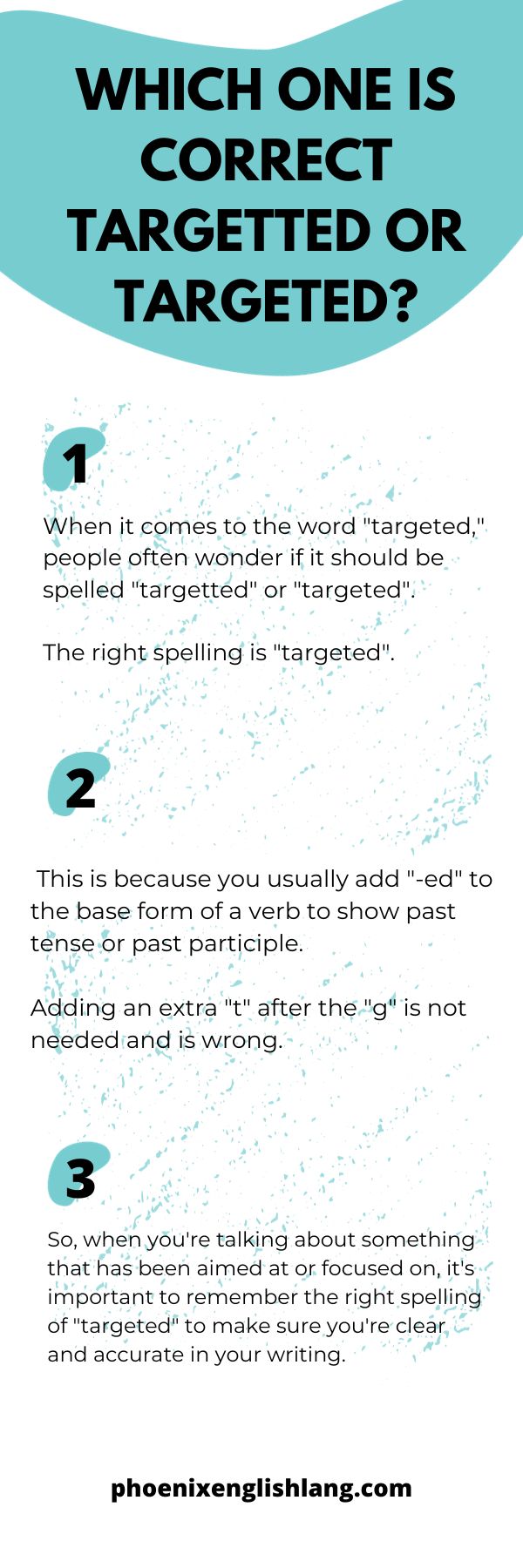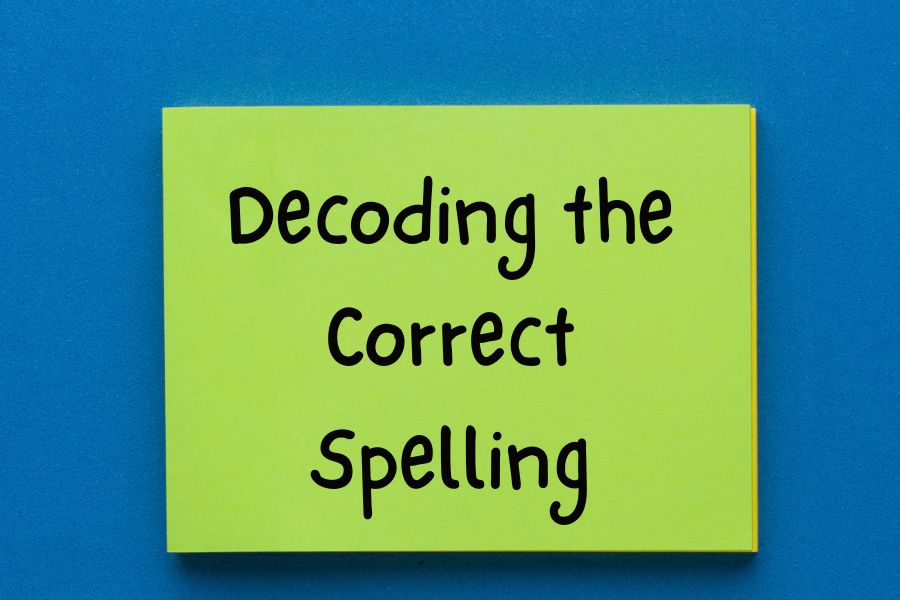The correct spelling is “targeted” with one ‘t’. This term is the past tense of “target,” meaning to aim at or direct toward a specific goal or audience.
In contrast, “targetted” is an incorrect spelling that does not appear in standard dictionaries and is not recognized in formal writing.

As we delve into the nuances of the English language, we often encounter words that can lead to confusion due to similar spellings and pronunciations.
“Targeted” and its incorrectly spelled variant “targetted” serve as a perfect example of this phenomenon.
In today’s fast-paced world of digital communication and marketing, the term “targeted” has become increasingly relevant, especially in discussions related to advertising strategies, audience engagement, and content delivery.
Understanding the correct spelling of “targeted” is essential not only for clear communication but also for maintaining professionalism in our writing.
Misspellings can undermine credibility and lead to misunderstandings, particularly in contexts where precision is vital, such as academic papers, marketing campaigns, or business proposals.
In 2025, as communication continues to evolve with the rise of online platforms and social media, adhering to proper spelling conventions becomes even more critical.
In this exploration of “targeted,” we will examine its definitions, correct usage, and common applications across various fields, including business, advertising, and technology.
Furthermore, we will provide examples to illustrate how to use “targeted” effectively in different sentences and contexts.
By clarifying these elements, this guide aims to empower readers to confidently use “targeted” in their writing, ensuring they can communicate their intentions accurately and effectively.
Let’s navigate through the clarity of spelling, usage examples, and the broader implications of being precise with language in our increasingly interconnected world.
Whether you are looking to enhance your professional writing skills or simply wish to gain a better understanding of this term and its context, this guide will serve as a comprehensive resource to elevate your language proficiency.
You might also enjoy: Top 100 Commonly Used Verbs That Start With D [2024]
Which one is correct Targetted or Targeted?

In my classes, I often get asked questions about using words correctly.
When it comes to the word “targeted,” people often wonder if it should be spelled “targetted” or “targeted”.
The right spelling is “targeted”.
This is because you usually add “-ed” to the base form of a verb to show past tense or past participle.
Adding an extra “t” after the “g” is not needed and is wrong.
So, when you’re talking about something that has been aimed at or focused on, it’s important to remember the right spelling of “targeted” to make sure you’re clear and accurate in your writing.
You might also enjoy:Looking Forward To Seeing You: Grammar + Examples[2025]
20 main differences of Targetted and Targeted
- Spelling: “Targetted” is a misspelling of “Targeted.”
- Correctness: “Targeted” is the correct spelling of the word.
- Language: “Targeted” is the standard spelling in American English.
- Language: “Targeted” is the standard spelling in British English.
- Consistency: “Targeted” follows the general rule of doubling the consonant when adding a suffix starting with a vowel.
- Consistency: “Targetted” does not follow the general rule of doubling the consonant when adding a suffix starting with a vowel.
- Clarity: “Targeted” is more easily understood and recognized by readers and speakers of English.
- Grammar: “Targeted” is the grammatically correct form of the word.
- Professionalism: “Targeted” is the preferred spelling in formal and professional writing.
- Accuracy: “Targeted” accurately represents the intended meaning of the word.
- Consistency: “Targeted” aligns with the spelling of other similar words in the English language.
- Linguistics: “Targeted” adheres to the principles of English phonetics and phonology.
- Standardization: “Targeted” is the spelling used in dictionaries and language references.
- Communication: “Targeted” ensures effective communication and understanding among English speakers.
- Education: “Targeted” is taught as the correct spelling in English language education.
- Writing conventions: “Targeted” follows the established conventions of English spelling.
- Word recognition: “Targeted” is more likely to be recognized and understood by spell-checkers and grammar-checkers.
- Online searches: “Targeted” is more commonly used in online searches and digital content.
- Consensus: “Targeted” is the widely accepted and agreed-upon spelling among language experts and authorities.
Navigating the Spelling: “Targetted” or “Targeted”? Examples and Clarification

In my classes, I often come across questions about spelling.
One common question is about the word “targeted”: is it spelled “targetted” or “targeted”? Let’s dig into this spelling mystery for clarity.
The correct spelling is “targeted.” This word follows the general rule of adding “-ed” to the base form of a verb to show the past tense or past participle.
Adding an extra “t” after the “g” is unnecessary and wrong.
To explain, think about these examples:
– The marketing campaign targeted specific demographics.
– The police targeted the notorious gang in their investigation.
– The teacher targeted the areas where students needed improvement.
By using “targeted” in these sentences, we make sure we’re right and follow the standard English spelling rules.
It’s important to remember that language changes over time, and while there may be variations, “targeted” is still the widely accepted and preferred spelling.
In conclusion, when dealing with the spelling of “targeted,” it’s important to remember the right form to make sure our writing is effective.
You might also enjoy: Beside The Point Or Besides The Point: Exploring the Difference [2023]
Some examples for targeted:

- Targeted therapy: Using medications or treatments that specifically target certain molecules or genetic mutations associated with a particular disease or condition.
- Targeted advertising: Delivering advertisements to specific individuals or groups based on their demographics, interests, or online behavior.
- Targeted marketing campaigns: Tailoring marketing strategies and messages to specific segments of the population based on their preferences, behaviors, or demographics.
- Targeted recruitment: Identifying and reaching out to individuals who possess specific skills or qualifications for a job opening.
- Targeted content recommendations: Using algorithms to suggest relevant articles, videos, or products to users based on their browsing history or preferences.
- Targeted social media campaigns: Creating and promoting content on social media platforms that is specifically designed to resonate with a particular audience or demographic.
- Targeted fundraising efforts: Directing fundraising initiatives towards specific groups or individuals who are more likely to support a particular cause or organization.
- Targeted security measures: Implementing security protocols and measures that are specifically designed to address the vulnerabilities and risks faced by a particular organization or system.
- Targeted customer service: Providing personalized support and assistance to individual customers based on their specific needs or issues.
- Targeted political campaigns: Using data analysis and voter profiling to tailor political messages and campaign strategies to specific demographics or regions.
- Targeted healthcare interventions: Implementing healthcare interventions or programs that are specifically designed to address the needs of a particular population or patient group.
- Targeted product development: Designing and developing products that meet the specific needs and preferences of a particular target market.
- Targeted environmental conservation efforts: Focusing conservation initiatives on specific habitats, species, or ecosystems that are particularly vulnerable or in need of protection.
- Targeted financial planning: Creating customized financial plans and investment strategies based on an individual’s specific goals, risk tolerance, and financial situation.
General Understanding
Correct Spelling
“Targeted” is the accurate form of the word, derived from the verb “target.” It refers to focusing on a specific aim or goal.
Incorrect Spelling
“Targetted” is a commonly mistaken spelling that does not exist in English dictionaries and is considered a typographical error.
Meaning in a Broader Context
The term “targeted” generally means to aim something at a particular group or goal.
Usage in Marketing
Marketing Campaigns
In marketing, “targeted advertising” refers to ads that are directed towards specific demographics. Example: The company launched a targeted advertising campaign aimed at young adults.
Audience Segmentation
“Targeted” strategies are essential for audience segmentation, ensuring that messages resonate with particular market segments. Example: The targeted approach ensured that the messaging was relevant to each segment of the audience.
Email Marketing
Businesses often use “targeted emails” to reach specific customer groups based on their preferences. Example: The retailer sent out targeted emails featuring products customers had previously browsed.
You might also enjoy:Emersion Vs Immersion: Meaning, Differences, and Examples
Business Applications
Sales Strategies
The term “targeted sales strategy” refers to focusing efforts on a specific customer base to improve sales efficiency. Example: Her targeted sales strategy resulted in a 20% increase in quarterly revenue.
Client Outreach
Organizations often engage in targeted outreach to establish connections with high-priority clients. Example: The sales team implemented targeted outreach to Fortune 500 companies.
Market Research
“Targeted research” is conducted to gather specific data about a defined market segment. Example: The targeted market research provided valuable insights into consumer behavior.
Social Media Context
Targeted Ads on Social Media
Social media platforms offer targeted advertising features to help businesses reach their desired audience. Example: The targeted ads on Facebook increased engagement with the brand.
Influencer Partnerships
Marketers often seek out influencers with targeted followings to enhance brand reach. Example: The brand collaborated with influencers who had a targeted audience interested in eco-friendly products.
Content Curation
“Targeted content” refers to tailored material that addresses the specific interests of an audience. Example: The blog features targeted content that speaks to tech-savvy millennials.
Educational Context
Targeted Learning Resources
Educators develop targeted learning materials for different student needs. Example: The teacher provided targeted resources for students who struggled with math.
Assessment Methods
“Targeted assessments” are designed to evaluate specific skills or knowledge areas. Example: The school district implemented targeted assessments to identify students needing extra support.
Student Outreach Programs
Educational institutions often engage in targeted outreach to recruit students from underrepresented communities. Example: The university initiated a targeted recruitment program for first-generation college students.
You might also enjoy:How Are You Fairing or Faring? Differences + Examples
Technology and Software
Targeted Software Solutions
Many companies offer targeted software solutions designed for niche markets. Example: The startup released a targeted software tool for healthcare professionals.
Data Analytics
“Targeted analytics” involve focusing on specific metrics that matter to business outcomes. Example: The team utilized targeted analytics to track the effectiveness of their campaigns.
App Development
Developers create targeted applications to meet the needs of specific user groups. Example: The app was targeted at fitness enthusiasts looking for personalized workout plans.
Public Health and Safety
Targeted Health Interventions
“Targeted health interventions” focus on specific populations at risk for certain illnesses. Example: The program implemented targeted health interventions for communities with high diabetes rates.
Vaccination Campaigns
Public health organizations often conduct targeted vaccination campaigns to boost immunization rates in specific areas. Example: Health officials launched a targeted campaign to increase flu shots in vulnerable populations.
Emergency Response Plans
“Targeted emergency response plans” are developed for areas prone to natural disasters. Example: The city created a targeted emergency response plan for flood-prone neighborhoods.
Sports and Fitness
Targeted Training Programs
Athletes often engage in targeted training regimens to improve performance in specific areas. Example: The coach designed a targeted training program focused on strength building.
Fitness Goals
“Targeted fitness goals” refer to specific achievements an individual aims to reach. Example: She set targeted fitness goals to run a marathon by next year.
Nutrition Plans
Nutritionists develop targeted nutrition plans tailored to individual health needs. Example: The dietitian created a targeted nutrition plan for weight loss.
Creative Arts
Targeted Artistic Messages
Artists often convey targeted messages through their work, addressing specific societal issues. Example: The mural’s targeted message spoke to the fight against climate change.
Performances
“Targeted performances” may refer to shows aimed at specific demographics. Example: The theater produces targeted performances for family audiences.
Literary Works
Authors may write targeted pieces that reflect the experiences of specific groups. Example: The novel features targeted narratives highlighting the lives of immigrants.
Legal and Regulatory Context
Targeted Legislation
Governments may enact targeted legislation to address specific social issues. Example: The targeted legislation aimed to reduce homelessness in urban areas.
Compliance Efforts
Companies often undertake targeted compliance efforts to meet specific regulatory requirements. Example: The firm implemented targeted compliance training focused on environmental regulations.
You might also enjoy:Too Cute Meaning Vs To Cute (To Vs Too) + Examples
Law Enforcement
“Targeted law enforcement” involves focusing resources on high-crime areas. Example: The police department adopted a targeted law enforcement strategy to combat drug trafficking.
Economic Context
Targeted Economic Policies
Governments implement targeted economic policies to stimulate specific sectors. Example: The government introduced targeted economic policies to support renewable energy initiatives.
Investment Strategies
Investors often pursue targeted investment strategies based on market conditions. Example: The fund manager adopted a targeted investment strategy focused on emerging markets.
Funding Opportunities
Organizations may provide targeted funding opportunities for projects addressing specific challenges. Example: The grant program offers targeted funding for educational initiatives in low-income areas.
Travel and Tourism
Targeted Travel Marketing
Travel agencies employ targeted marketing to attract specific traveler demographics. Example: The agency launched a targeted marketing campaign aimed at adventure seekers.
Destination Promotions
“Targeted promotions” are designed to attract tourists to particular destinations. Example: The tourism board developed targeted promotions for historical sites.
Group Travel Offers
Travel companies often create targeted group travel offers for specific audiences. Example: The company provided targeted group travel packages for corporate retreats.
Common Errors and Clarifications
Frequent Misspelling
“Targetted” is a common misspelling that arises due to the double ‘t’ rule; however, it does not apply here. Example: Many people mistakenly write “targetted” due to phonetic assumptions.
Spell Check Limitations
Spell check tools may not always flag “targetted” as an error, leading to its acceptance in informal contexts. Example: Relying solely on spell check could lead to using “targetted” incorrectly.
You might also enjoy:What Kind of Vs What Kinds of – Differences + Examples [2025]
Pronunciation Consistency
Despite the prevalence of the misspelling, pronunciation remains consistent; both terms sound the same. Example: Both “targeted” and “targetted” are pronounced /ˈtɑːrɡɪtɪd/.
Academic Usage
Research Terminology
In academic writing, the correct term “targeted” is essential for articulating focused studies. Example: The research utilized targeted methodologies to gather data from specific populations.
Thesis Statements
A targeted thesis statement is crucial for establishing the scope of research. Example: The thesis presented a targeted analysis of economic trends in developing countries.
Project Proposals
“Targeted project proposals” specify goals and objectives tailored to particular issues. Example: The proposal included targeted objectives for addressing local community needs.
Conclusion
Importance of Correct Usage
Using “targeted” properly enhances clarity and professionalism in communication. Example: Clarity in language reflects competence in a professional setting.
Implications of Miscommunication
Using “targetted” may lead to confusion or misinterpretation in professional documents. Example: Miscommunication can arise in formal reports when terms are misspelled.
Professionalism in Writing
Maintaining accurate spelling demonstrates attention to detail, an important trait in professional environments. Example: Clear, correct communication fosters credibility and reliability.
Quick Reference
Remember the correct spelling: “targeted” with one ‘t’ for clarity. Example: Always double-check your spelling in professional documents.
Practicing Usage
Regularly use “targeted” in writing to reinforce correct spelling and application. Example: Engage in writing exercises focused on using “targeted” correctly.
Peer Review
Utilize peer review or proofreading tools to help identify potential misspellings. Example: Having a colleague review your work can catch mistakes like “targetted.”
Learning from Examples
Familiarize yourself with examples of proper usage to internalize the correct form. Example: Review marketing materials that use “targeted” appropriately.
Continuous Improvement
Engage in continuous learning to refresh your understanding and usage of terms like “targeted.” Example: Workshops and writing courses can enhance vocabulary skills.
You might also enjoy:Interested In or On: The Differences + Examples [2025]
Unraveling the Spelling Dilemma: “Targetted” versus “Targeted” with Illustrative Examples

In my classes, I often get asked questions about spelling, and one common question is about the word “targeted.” Students always wonder if it should be spelled as “targetted” or “targeted.”
Let’s figure out the right way to spell it. The correct spelling is “targeted.” You just add “-ed” to the base form of the verb to show the past tense or past participle.
Adding an extra “t” after the “g” is not needed and wrong.
To show you, let’s look at some examples:
1. “The marketing campaign targeted a specific audience.” Here, “targeted” is used as the past tense of the verb “target,” meaning that the campaign focused on a particular group.
2. “The advertisement targeted potential customers.” In this sentence, “targeted” is the past participle, describing the action of aiming the advertisement at potential buyers.
By using the correct spelling, “targeted,” we make sure our writing is clear and accurate.
It’s important to remember this spelling rule so we don’t get confused and can keep things professional in our writing.
Point:
People might write “targetted” instead of “targeted” because they mess up the spelling or get confused about how to spell it.
In English, we spell “targeted” with just one “t” after the “r.” But some folks might mistakenly put an extra “t” in there because they want to make sure it sounds right.
In my classes, I make a big deal about proofreading and using the right spelling so that our communication is clear and accurate.
So it’s super important to use the correct spelling “targeted” if you want to come across as professional and avoid any mix-ups or misunderstandings.
Decoding the Correct Spelling: “Targetted” or “Targeted”? Examples and Insights

In my classes, I always get into the details of spelling stuff right.
One thing that comes up a lot is whether to spell the word as “targetted” or “targeted.” The right spelling is “targeted.”
You gotta know the basic rule of adding “-ed” to the base form of a word to show past tense or past participle.
In this case, the base form is “target,” and you don’t need to put an extra “t” after the “g.” That’s just not necessary and not right. To show you what I mean, let’s look at some examples:
“The marketing campaign targeted specific demographics,” or “The detective targeted the suspect as the prime suspect.”
In both cases, “targeted” is the right spelling, meaning aiming or focusing on a specific target.
By figuring out the right spelling, we make sure our writing is accurate and clear.
Knowing these details gives us the power to express ourselves well and with confidence.
20 points about using Targetted and Targeted
- “Targetted” is a variant spelling of the word “targeted.”
- “Targeted” is the standard spelling in American English, while “Targetted” is more commonly used in British English.
- Both “Targetted” and “Targeted” are past tense forms of the verb “target.”
- The primary meaning of “targeted” is to aim at or focus on a specific goal, objective, or audience.
- Using the correct spelling, whether “targeted” or “targetted,” depends on the style guide or region’s preferred spelling.
- “Targeted” is the more widely recognized and accepted spelling in international English usage.
- It is essential to maintain consistency in spelling throughout a document or communication.
- Spell check tools may flag “Targetted” as a misspelling in American English writing.
- When unsure about which spelling to use, referring to a trusted dictionary or style guide is recommended.
- Both spellings are pronounced the same way, regardless of the number of “t” letters.
- In the context of marketing, “targeted” refers to tailored strategies aimed at specific demographics or segments.
- “Targeted advertising” is a common term used to describe ads directed at specific audiences based on their interests or behaviors.
- The spelling “Targetted” may be seen as archaic in modern writing and may not be favored by language purists.
- Understanding the intended audience can help determine the level of specificity required in targeting.
- Using the appropriate spelling of “targeted” demonstrates attention to detail in written communication.
- Employing targeted strategies in business can lead to more effective marketing campaigns and higher engagement rates.
- When proofreading written work, it is essential to check for consistent spelling of terms like “targeted.”
- In academic writing, precision in language, including correct spelling, is crucial for conveying professionalism and credibility.
- “Targeted” can also refer to directed actions or efforts, such as targeted interventions in healthcare or targeted strikes in military operations.
- Whether using “targeted” or “targetted,” clarity and precision in language help ensure that the intended message is effectively communicated to the audience.
Understanding the Spelling Variations: “Targetted” versus “Targeted” Explored

In my classes, I always get into the nitty-gritty of different ways to spell words and how it affects writing.
One common question that comes up is the difference between “targetted” and “targeted.”
Let’s look into this more.
The right way to spell it is “targeted.”
This follows the general rule of adding “-ed” to the base form of a verb to show past tense or past participle.
But some people might mistakenly add an extra “t” after the “g” and end up with “targetted.”
While “targetted” might sound right because of the double “t” in “target,” it’s important to know that this spelling is wrong.
Adding the extra “t” is totally unnecessary and goes against the normal English spelling rules.
Using the right spelling, “targeted,” makes sure that everything is clear and consistent in written communication.
It’s super important to stick to the usual spelling rules so that we can be accurate and get our message across effectively.
By knowing all the different ways words can be spelled and picking the right one, we can improve our writing skills and make sure that other people understand what we’re saying.
You might also enjoy:Where Does “How is your Day Going?” Originate From?
Comparing the Spellings: “Targetted” versus “Targeted” with Real-life Examples
In my classes, I always talk about how important it is to spell things right when you write.
A lot of people ask if “targetted” is the right way to spell “targeted.”
But, the right way is actually just “targeted.” You don’t need to add an extra “t” after the “g.”
To show you, let’s look at some real-life examples.
When a company is doing marketing, they might make a targeted ad campaign to reach a specific group of people.
By customizing their message for a certain group of people, they want to make the biggest impact.
Just like in law enforcement, investigators might use specific surveillance techniques to focus on certain individuals or groups they are interested in.
Making sure we spell “targeted” right helps us be clear and precise in what we mean.
It’s super important to use the right spelling rules to sound professional and get our ideas across.
So, whether it’s in business, school, or just everyday writing, remembering how to spell “targeted” correctly is really important for clear and accurate communication.
Conclusion
In summary, the appropriate spelling of the word in question is “targeted.” While this may appear to be a minor detail, it plays a crucial role in enhancing the clarity and professionalism of your writing.
Although some individuals may prefer the spelling “targetted,” it is essential to adhere to the conventional spelling rules of the English language.
This commitment to standard spelling practices not only fosters consistency but also guarantees that your writing is comprehensible to a wide audience.
In this article, we have examined various instances and explanations to illustrate why “targeted” is the correct and commonly accepted spelling. By analyzing the rules governing consonant doubling and reviewing practical examples, it becomes evident that “targeted” aligns with the established patterns of English spelling.
Such consistency is vital as it helps prevent confusion and miscommunication. When a uniform spelling is employed, it facilitates a clearer understanding and interpretation of written content.
Language serves as a vital instrument for communication, making precision in its usage crucial. Consistency in our linguistic choices enables effective communication and minimizes the risk of misunderstandings. This is especially significant in professional and academic environments, where clarity and accuracy are of utmost importance.
Correctly spelling words such as “targeted” demonstrates attention to detail and a dedication to maintaining high writing standards.
Furthermore, a solid understanding and application of spelling conventions can bolster your credibility as a writer.
Whether composing an academic essay, a business document, or a personal blog entry, correct spelling indicates a strong command of the language and a serious approach to writing. It also fosters trust with your audience, as they can depend on you for accurate and well-crafted content.
Therefore, it is essential to use “targeted” when referring to this term, ensuring precision and clarity in both our writing and speaking. This seemingly minor detail can significantly influence the perception of your writing. By consistently adhering to correct spelling, you enhance the overall clarity and effectiveness of your communication.
In addition to improving your own writing, understanding the correct spelling of words like “targeted” can also help you assist others. Whether you are a teacher, a mentor, or simply someone who enjoys helping others with their writing, knowing the correct spelling rules allows you to provide accurate guidance.
This can be particularly valuable in educational settings, where students are learning the intricacies of the English language and developing their writing skills.
Furthermore, being aware of common spelling pitfalls and how to avoid them can save you time and effort in the long run. Instead of second-guessing yourself or having to look up the correct spelling repeatedly, you can write with confidence, knowing that you are using the correct form.
This can make the writing process more efficient and enjoyable, allowing you to focus on expressing your ideas rather than worrying about spelling errors.
Frequently Asked Questions
- What is the difference between “Targetted” and “Targeted”?
“Targetted” is a variant spelling of the word “targeted,” with “Targeted” being the standard spelling in American English.
- Can you provide an example of when to use “Targeted” in a sentence?
Certainly! An example sentence using “Targeted” is: “The marketing campaign was targeted towards young adults.”
- When should one use “Targetted” instead of “Targeted”?
“Targetted” is more commonly used in British English, while “Targeted” is preferred in American English; however, both are acceptable variants.
- How can one determine which spelling of “Targeted” to use in a document?
It is advisable to follow the spelling conventions of the English language variant being used (e.g., American English or British English).
- In what context might one opt to use “Targeted” as opposed to “Targetted”?
“Targeted” is often used in formal writing, technical documents, marketing materials, and academic papers to maintain standard spelling.

Hi, welcome to my blog! My name is Omid and I am thrilled to have you here! I am an English language teacher with 12 years of experience and hold multiple international certifications (TESOL, IELTS, TOEFL, PTE, CELTA). Additionally, I hold a PhD in Applied Linguistics with a specialization in Teaching English as a Second Language (TESL), which fuels my passion for teaching English and assisting others in mastering the language. To me, nothing is more rewarding than helping individuals enhance their English language abilities through various methods. So, let’s embark on this journey of learning English together.




